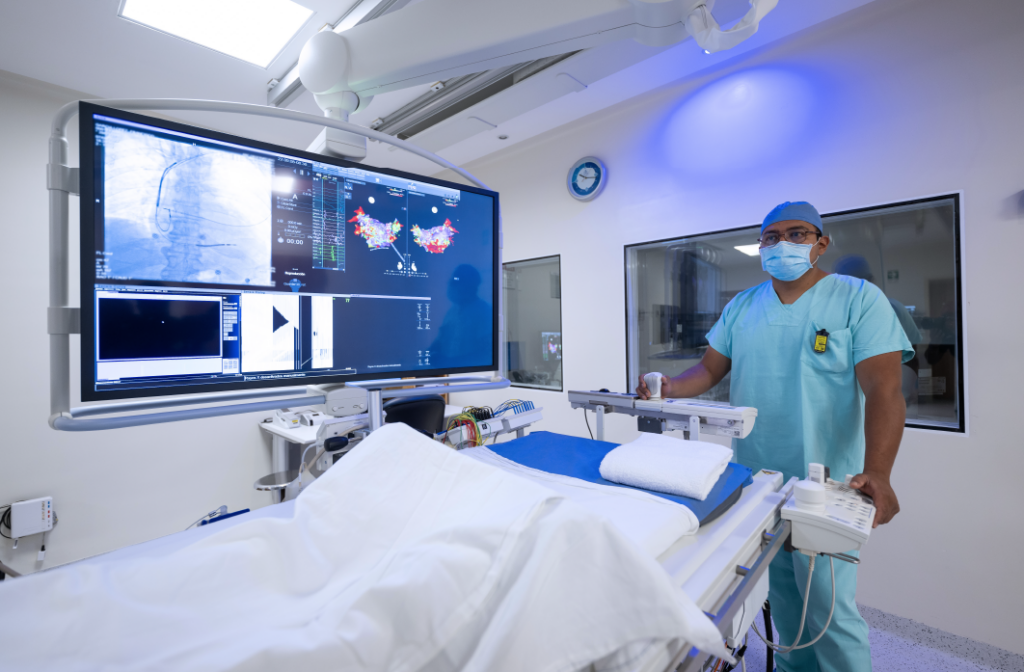Arrhythmias occur when the electrical impulses that coordinate the heartbeat are abnormally fast, irregular, or come from places other than the normal conduction system of the heart. This causes you to suffer from tachycardia (heartbeats too fast), bradycardia (heartbeats too slow), or irregular heartbeats.
Any individual can present arrhythmias regardless of their age, that is, from children to older adults. Arrhythmias manifest differently in each individual, either with palpitations, racing heart (“tachycardia”), dizziness, shortness of breath, or even loss of consciousness (fainting).
Catheter ablation and CARTO system
80% of cardiac arrhythmias can be treated by catheter ablation, thus eliminating the need for medication. This procedure allows very small scars to be created in the areas of the heart that are involved in heart rhythm problems. Although many of these arrhythmias can be treated with the conventional system, there is a group of complex arrhythmias that require special mapping called CARTO, which consists of three-dimensional (3D) electro-anatomical mapping.
- CARTO is a special 3D electro-anatomical reconstruction system that allows navigation inside the cardiac chambers in real-time, without fluoroscopy, and with great precision.
- By not requiring X-rays (fluoroscopy), the patient will not be exposed to radiation with the use of CARTO (if the “zero-fluoroscopy” method is used), or in any case, will be minimal.
- With the CARTO system, the heart chambers can be reconstructed and the image obtained can be used as a “GPS map”, locating the place of origin of these arrhythmias with great accuracy, which facilitates their elimination.
The CARTO electro-anatomical mapping equipment uses catheters that have a location sensor to acquire the electrogram automatically and simultaneously in each position, as well as its coordinates in each location, thus creating a three-dimensional electro-anatomical map of the chamber where the arrhythmia originates, providing real-time information that is highly relevant to ablation.
Arrhythmias commonly treated with the CARTO system
CARTO provides information on the electrophysiological alterations of the cardiac rhythm, thanks to the fact that it identifies areas of prematurity, reentrant circuits, or areas of fibrosis (scar). Therefore, it is an essential tool for the treatment of catheter ablation of arrhythmias such as atrial fibrillation and ventricular tachycardia, among others. About 2% of the world’s population has a type of arrhythmia called atrial fibrillation and the CARTO system is essential for its treatment. The following arrhythmias are commonly used for CARTO:
- Atrial fibrillation (in its different varieties: paroxysmal, persistent, or permanent).
- Atypical atrial flutter (sometimes also very useful in typical flutter).
- Frequent atrial premature beats.
- Atrial tachycardia.
- Frequent or very symptomatic ventricular premature beats.
- Ventricular tachycardia (of any cause).
Patient Benefits of the CARTO System
- Little invasive procedure for the patient (performed through the groin).
- 80% of cardiac arrhythmias can be treated with catheter ablation, eliminating in many cases the permanent use of drugs.
- Reduction or elimination of radiation during catheter ablations since X-rays are not necessary to follow the catheter.
- The procedure takes about four hours and generally requires only an overnight hospital stay.
Ablation with CARTO at ABC Medical Center
In cardiac ablations with a heat technique (“radiofrequency”) performed with the support of CARTO, several catheters are inserted through the groin. The millimeter tip of the ablation catheter will burn the inner surface of the heart, allowing the arrhythmia to be cured.
Within ABC Medical Center, this radiofrequency ablation service is offered through the CARTO system with the most recent software updates, to provide the best results for patients.
It is important to note that these procedures are performed by renowned electrophysiologists, that is, cardiologists highly specialized in electrophysiology, who identify and treat arrhythmias through high-resolution studies such as CARTO and interventional procedures such as cardiac ablation. All the electrophysiologists that belong to the Medical Corps (Staff) of the ABC Medical Center have the certification and validity of the Mexican Council of Cardiology, which ensures their professional excellence.
Intervention rooms at ABC Medical Center
Cardiac ablation procedures are performed at both Campuses, Observatorio and Santa Fe, in dedicated spaces called “Intervention Rooms”, which are operating room-type areas, dedicated exclusively to minimally invasive techniques, which, allow diagnosis and treatment of these heart diseases through fine catheters guided by fluoroscopy and with image acquisition.
The Intervention Rooms at ABC Medical Center are among the most modern in Mexico, they have large spaces to work, they are fully equipped, and have the most modern technology for these procedures, including CARTO.
At ABC Medical Center’s Cardiovascular Clinics, we can provide you with specialized care. Contact us!
Fuente:
Dr. Manlio Fabio Márquez Murillo, Deputy Chief of Electrophysiology – ABC Medical Center
https://www.revespcardiol.org/es-la-cartografia-electroanatomica-no-fluoroscopica-articulo-13056506
https://www.mayoclinic.org/es/diseases-conditions/heart-arrhythmia/symptoms-causes/syc-20350668#:~:text=Una%20arritmia%20card%C3%ADaca%20es%20un,del%20coraz%C3%B3n%20no%20funcionan%20adecuadamente.
https://www.grupocorpal.com/carto-tratamiento-de-arritmias-complejas/
https://www.medicalexpo.es/prod/biosense-webster/product-71118-450448.html



